Movie Review – Pearl Harbor
Michael Bay, I think, as a fan of your work generally, I should point out the lesson you ought to have learned from Pearl Harbor. You simply cannot direct a Sunday afternoon romance film: you lack the subtlety to do so adequately. You should stick to your best qualities, and that’s directing some of the most dazzling, cinematically epic action films ever made. Explosions and romance generally don’t mix to well in conventional film. I think Pearl Harbor failed because you alienated both the women, who didn’t want to see people being blown up, and the blokes, who didn’t want to see Ben Affleck snogging Kate Beckinsale for an hour and a half, and thus drove both audiences to despair.
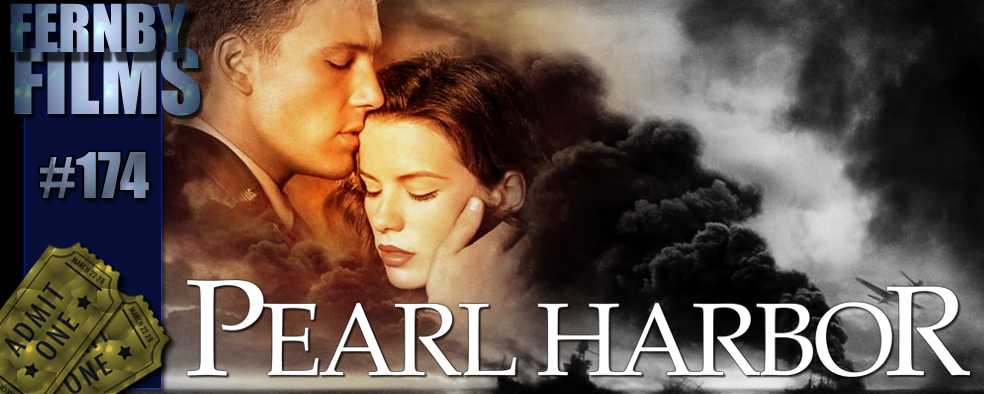
– Summary –
Director : Michael Bay
Cast : Ben Affleck, Josh Hartnett, Kate Beckinsale, Ewan Bremner, Tom Sizemore, Cuba Gooding Jr, Jon Voight, Colm Feore, Mako, Alec Baldwin, William Lee Scott, Jamie King, Jennifer Garner, Michael Shannon, Matt Davis, Cary-Hiroyuki Tagawa, Dan Aykroyd, Tom Everett, Tomas Arana, Kim Coates, William Fichtner, Leland Orser, David Kaufman.
Year of Release : 2001
Length : 184 Minutes (Directors Cut)
Synopsis: Two friends fight for the affections of the same woman. They beat each other up, tell each other they love each other, and look around in lots of slo-motion. Oh, and apparently the Japanese want to bomb America. There’s lots of explosions.
Review : If it wasn’t for the action sequences, this film would be a romantic comedy turd. With the action scenes, it’s a dramatic misfire wanting badly to be an action film. Often incomprehensible, occasionally superior filmmaking, Pearl Harbor is one of the biggest “if only they’d done it better” films you’re likely to see.
I’ve long asserted on this site that Michael Bay is one of my favourite directors. I have no qualms telling people this, and I think, given the right script and story, he’s a director with a stunning eye for what looks great up on a huge screen in thunderous surround sound. Armageddon, The Rock, The Island, more recently Transformers; all films that have rocked in a big, big way. Bay is the master of hyperbolic, kinetic filmmaking, the kind of stuff that makes cinema so cinematic, he can turn even the most boring action moment into a vibrant, cataclysmic screen event. Bay’s films have often had a polarising effect on the cinema-going public. Generally, in most website forums you’ll come across where his work is dissected, you’ll find the now common phrase “Damn You Michael Bay”, which is a deplorably pathetic epithet to fling at a man whose love for the craft is so ingrained, so obvious, that every moment in his films are filled with a sense of immediacy, a sense of cinematic steadiness, that you can’t help but be dragged along for the ride. Yeah, I know this is starting to sound like a love letter to the man, but I wanted to give you my opinion of him so that the rest of this review can be taken in the context I mean it, framed by the admiration I have for his style and technique.
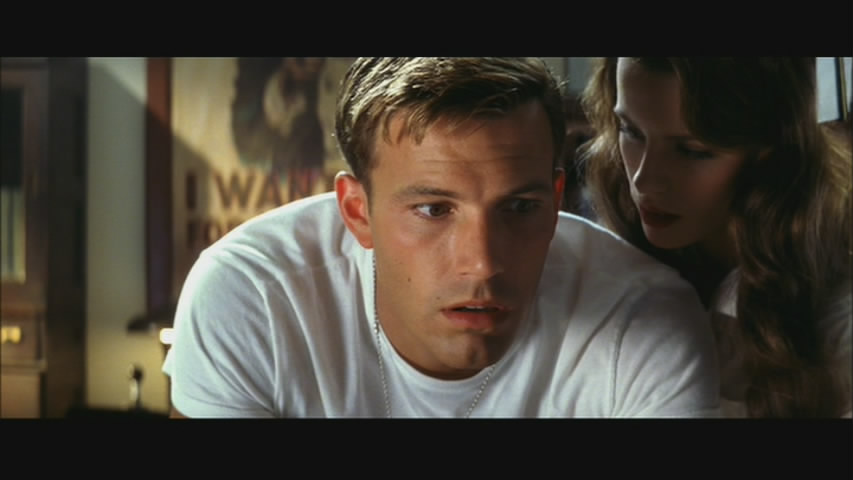
Pearl Harbor, simply put, sucked big time. Mauled by critics, flailed by online forums and fan-boys alike, and generally perceived as some kind of Titanic-clone, Pearl Harbor remains perhaps the least appreciated, or understood, of Bay’s films thus far. That’s not to say that I liked it, which I did in bits and pieces. I don’t find Pearl Harbor to be one of Bay’s crowning achievements, although I can see what he was aiming for. Sometimes, like Jagger and Richards often stated, you can’t always get what you want. With this film, Bay wanted a grand, epic war film, coupled with the teen-angst of a romantic triangle, just to add spice to the proceedings. But somewhere, it all fell apart, and Pearl Harbor became a jumbled mess of missed opportunities, arrogance towards an audience with a limited attention span for it, and ultimately, a dramatic story that just couldn’t sustain a 3 hour film.
Pearl Harbor starts off as a fairly innocuous, and tame, romance story, with Ben Affleck and Josh Hartnett playing soldiers in WWII, who meet nurse Kate Beckinsale. Affleck’s character, Rafe McCawley, and Beckinsale, playing Evelyn, fall for each other, and develop a romance as the war progresses, even though the US is not currently involved. All three are stationed at Pearl Harbor, awaiting orders. Both McCawley and Danny Walker (Hartnett) are pilots in the air force, and although the US is not involved in WWII at this point, McCawley wants to fight, and goes to Europe to join in the British defence against the Germans. When he’s shot down, McCawley is reported back to the US as dead, which, understandably, upsets both his best friend Danny, and his lover Evelyn. In consoling each other through this loss, both Danny and Evelyn fall in love, and it’s only when McCawley shows up from England alive and well, that the romantic twist takes centre stage. There’s a short fight, and then the two boys are best buds again, although Evelyn has to make a choice between them. Then, about an hour into the film, the Japanese attack Pearl Harbor, and the film goes into manic overdrive with the carnage and catastrophe playing out as large as life in one of the greatest cinematic battle sequences ever committed to film. After the attack, both McCawley and Danny are seconded to take part in a retaliatory attack, led by famed Major Doolittle (a solid Alec Baldwin), which involves a one-way trip over the skies of Japan to deliver some bombs.
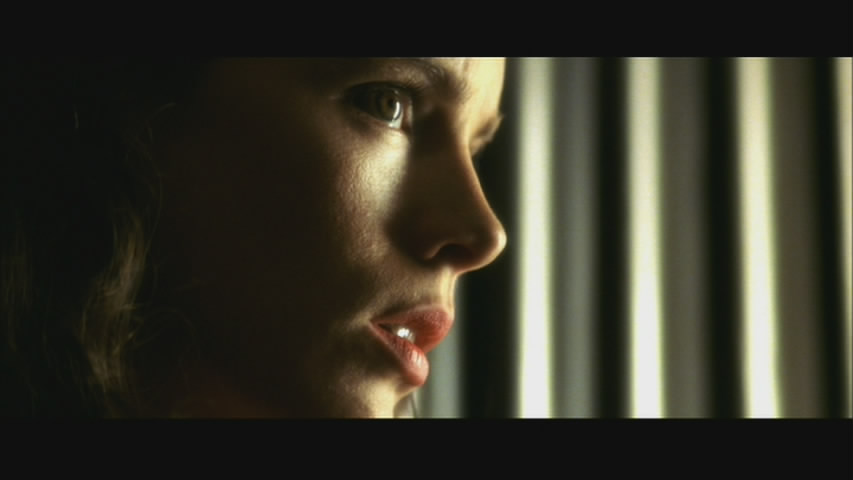
I think Bay watched James Cameron’s Titanic, saw how good a romantic storyline threaded through historical events could work, and decided to apply that to one of the USA’s greatest military disasters. If his intent was to engender some sense of pride in the troops that were lost, or in America’s triumphant retaliation, or even in a sense of historical truth, audiences didn’t get it. What they got was an overwrought melodrama played out via the carnage and destruction inflicted by the Japanese and some major mistakes by the US military brass. And it’s didn’t fly.
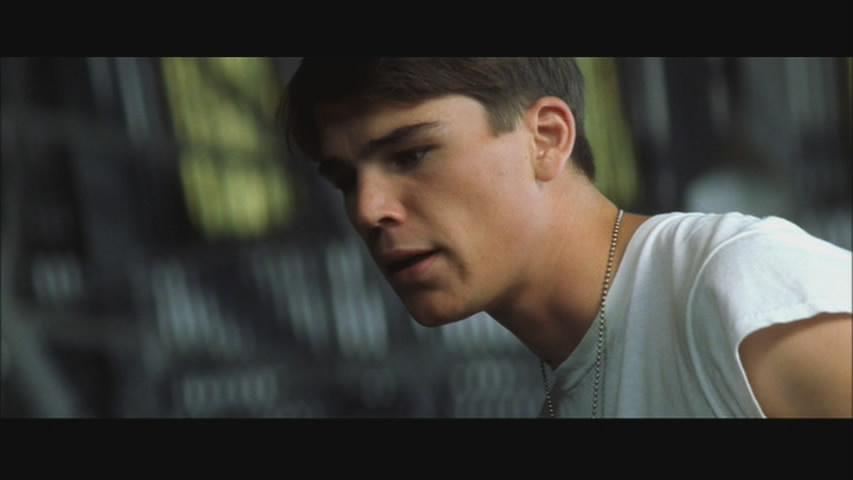
First, the good.
The battle scenes, from the initial Japanese attack, the American retaliation in the immediate aftermath, and then the followup retaliation over the skies of Japan, are staggeringly good action/battle set pieces that deserve to be seen as large and loud as possible. Bay’s camera covers so much territory here, with bombs dropping, navy destroyers capsizing, planes crashing, people dying, that you almost become desensitised by it all at the end. Yet, there remains enough emotional pull throughout the hugely choreographed action sequences that you overlook the occasionally histrionic slo-motion moment, the scourge of a lot of Bay’s earlier work. His staging of the Japanese attack on the harbour is stunning, large scale filmmaking done as real as possible. The bombing and sinking of the USS Arizona, one of the pride of the naval fleet, is dramatic, superbly executed, and filled with the gravitas the moment requires. Yet, around this, all the Sturm und drang is merely window dressing for an overly ambitious romantic sub-plot. When the explosions begin, they don’t stop, for at least forty five minutes. It was a much lauded fact by critics, who seemed to enjoy their snide remarking, that the film version of the attack lasts a lot longer than the actual event did in real life. Well, that may be true, but then, this is cinema, you dolts, and a director can take as long, or short, as he wants to tell a story. This moment, when the attack begins, and people begin to die, is riveting filmmaking, the kind of stuff Bay does so well. He understands the cinema camera, the way an explosion looks on screen, the way action needs to be told, and he puts you right in the middle of the biggest military scrap of all.
The impact of this sequence, which goes on for so long you begin to wonder about the romantic sub-plot a little, is negated somewhat by the seemingly indestructible good-lookingness of the cast. Bay has filled his core cast with some of the most good-looking people ever seen in a war film. Affleck’s jaw looks so square it could be mistaken for mathematics apparatus, and Hartnett’s eyes could melt granite, he lovingly casts about so much it’s almost sickening. Bay’s token ugly person, in the form of the hilarious (always) Ewan Bremner (Spike in Trainspotting, keep up people!) is only in the film for comic relief, and he’s vastly underdone.
Now, the bad. You sitting comfortably? Good.
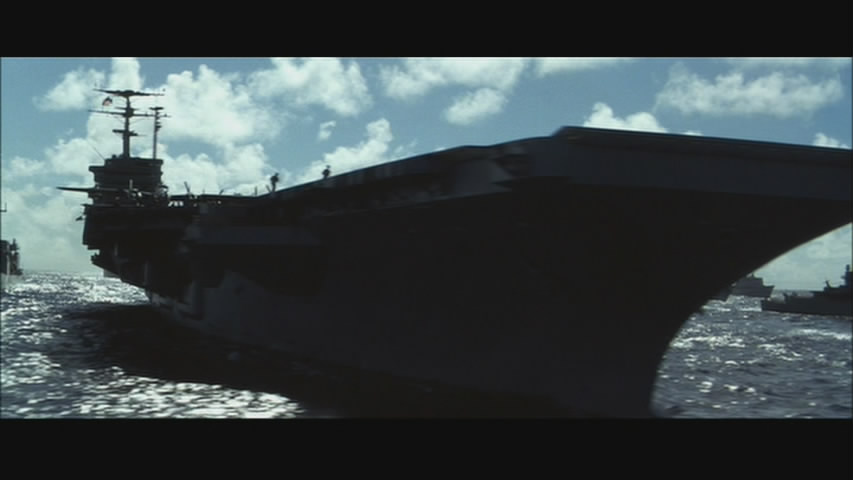
The main storyline, the romantic one, is disappointing, redundant, and badly executed. Dramatically, it adds nothing to the main thrust of the film to have your three central cast members engaged in an awkward love-triangle when war is imminent. The focus of the film needed to be either one, or the other, but it couldn’t stand up to both. Randall Wallace, who scripted the Mel Gibson epic Braveheart, which in itself delivered a wonderful balance between the action and the dramatic narrative, tries to shoehorn in an improbably love between Hartnett and Beckinsale, while riding roughshod over the Beckinsale/Affleck debacle (neither had great chemistry together, and it was poor casting that led to this, methinks) and treating the actual attack on Pearl Harbor like an obstacle to be overcome than the massive, world changing event it actually was. This senseless misalignment of priority, in a film grandstanding as a definitive look at the attack on Pearl Harbor, is subversive and pointless to the extreme. Wallace should have done away with the bloated, inane romantic rubbish, and stuck to the gritty, patriotic war-story the film probably should have been. After all, the women going to see this would most likely shut their eyes when the bullets, bombs and bodies start flying, and conversely their male counterparts would be squirming in their seats while viewing the implausible, wooden, and plainly clichéd romantic moments, that played like Harlequin romance novel on opiates of some sort. The film cannot decide if it wants to be a graphic, gritty war film, or a silky, shiny romance film. It’s neither, as both narratives cancel out the impetus of the other, thus reducing Pearl Harbor to a toothless, emotion-free dirge to lives lost, love lost, and a major amount of money lost too.
I think Bay struggled to balance out the multitude of characters as well as the film required, too. The plethora of political underpinnings, the massive scope of such a history shaping event, needs more focus on the back story to engender the appropriate sense of scale and empathy towards the eventual victims of this cowardly attack. The Japanese side of the event, told in brief cutaway scenes, and given little real impetus in the overall film, is a blithely rendered lip-service to the attacking force which invokes little more than generic, racist sentiment by the cinema-going audience. The Japanese forces are portrayed as simply doing their duty, wooden faced and only marginally emotional about the whole affair. This is such a criminal overlooking of a part of the historical context of the film. Yet, we are treated to more of Beckinsale and Affleck, and Hartnett, all cooing at each other in sepia-toned soft focus, and are meant to think this is high art.
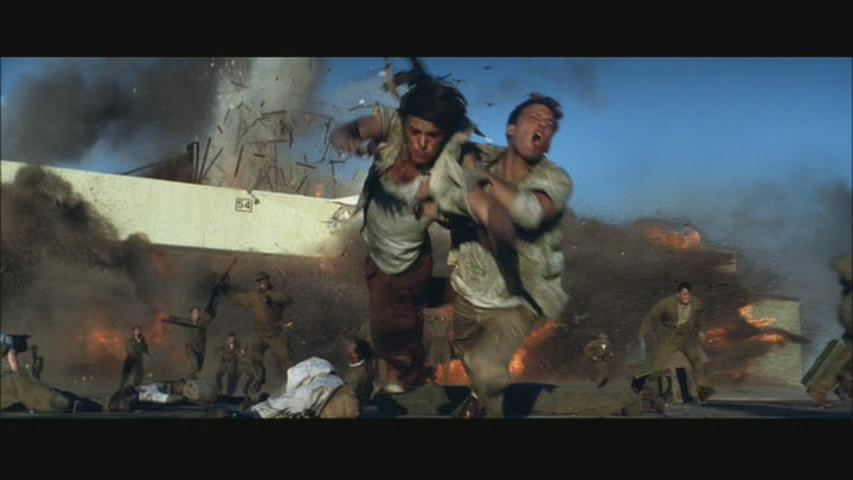
The rest of the characters in the film serve as cannon-fodder, equally as disposable as the next person, since they’re predominantly fictional (except for the real people, like President Roosevelt et al), which means that Bay can treat his viewers, and history, with the self-righteous piety the patriotic US prides itself in: only the ships cook gets to fire one of the big machine guns, bringing down enemy planes, to the hoots of joy from the audience. Casting Cuba Gooding Jr as Dorie Miller, the ships cook, is perhaps a little bit of overkill on the filmmakers part, after all, it’s hard to look at the man without thinking “Show me the money”, and that ruins the motivations of Bay in telling the story. Tom Sizemore gets the lions share of laughs as the gruff, strides-through-a-hail-of-bullets mechanical dude, is jaw-clenchingly clichéd in this film, and it’s a testament to Bay’s skill as a director that he got such an ordinary performance out of him: normally he’s worse. But his square jawed gung-ho attitude will no doubt get you laughing as he bullies his young soldiers into action, and stands like Robert Duvall in Apocalypse Now, the flames of destruction licking all around him, barely blinking in the devastation. Except there’s no napalm here.
The film is so interminably long, by the time you get to the actual attack, you almost want the film to end right there. Just blow everything up, roll credits, lets go home. But it doesn’t. After a forty five minute explosion of sound and fury, ending with Jon Voight’s dramatic rendition of Roosevelts “December 7th, 1945, a date which will live in infamy” speech, and Hartnett effusing lovingly to Sizemore that Affleck taught him everything he knows about flying (in wonderful magic-hour lighting, with grease and grime in appropriately manly places), the film still has about an hour to go. After all, Bay can’t let the attack on Pearl Harbor go past without a little payback by the good old air force lads. There’s a bunch more soliloquising between Beckinsale, Affleck and Hartnett, a lot more soft focus glaring at each other, and then the boys are off on their mission to blow the crap out of the Japanese, give them a taste of their own medicine.
I have to say, this part of the film feels a lot like mere padding. After all, the Yanks can’t just let a smack across the face go by without returning the favour. So we get a chance to see just how the Japanese liked being on the receiving end of some major ordinance. It’s here that the film truly comes apart, breaking down into a histrionic, blithering mess of conflagrated emotions, hyperbolic acting, and a complete lack of respect for the events previously foretold in the film. It’s all about Danny and McCawley, as they come to terms with the fact that they both love the same chick. Hallmark moments, here we come, as honour, trust and the bond of brotherhood absconds with the thrust of a bayonet and the throwing of a grenade: the Japanese corner our heroic duo in their crashed plane, and the gunfight soon takes it’s toll. Of course, the manly tears Ben Affleck has perfected (especially in Armageddon) come out here as well, and Hartnett’s nowhere near the same level of actor to do the same. And thus, the film becomes merely a bad pantomime romantic piece, with some explosions, rather than Bay’s intentioned mark of respect to the soldiers who died and fought for their country, in it’s darkest hour.
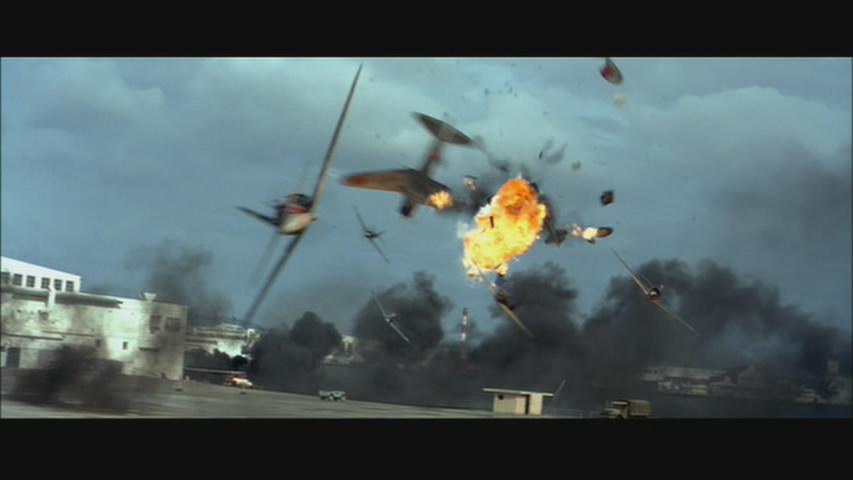
The problem with Pearl Harbor isn’t so much the acting (although it’s not that great either) or the production values. No, I lay the film’s central issue at the feet of the screenwriter, in this case, the aforementioned Mr Wallace. The lack of dramatic focus, and an over-reliance on the romantic too-ing and fro-ing, ensure the film is more distended than it should have been. The focus of the film needs to be on the event in the title, not some large scale, badly acted romance. A friend and I watched this film, skipping directly to the action sequences, making the film about an hour long overall. We skipped all the love stuff, all the overblown narrative setup, and went straight to the booms. And Pearl Harbor was a great action film. It was the best way to watch it, and a real plus for DVD.
Michael Bay, I think, as a fan of your work generally, I should point out the lesson you ought to have learned from Pearl Harbor. You simply cannot direct a Sunday afternoon romance film: you lack the subtlety to do so adequately. You should stick to your best qualities, and that’s directing some of the most dazzling, cinematically epic action films ever made. Explosions and romance generally don’t mix to well in conventional film. I think Pearl Harbor failed because you alienated both the women, who didn’t want to see people being blown up, and the blokes, who didn’t want to see Ben Affleck snogging Kate Beckinsale for an hour and a half, and thus drove both audiences to despair. I love your work, and I can see the valiant attempt to make something above and beyond what I originally thought you capable of. But Pearl Harbor remains, definitively, a creative shambles undone by a bloated, unnecessary script, and some hamfisted acting by your central cast.
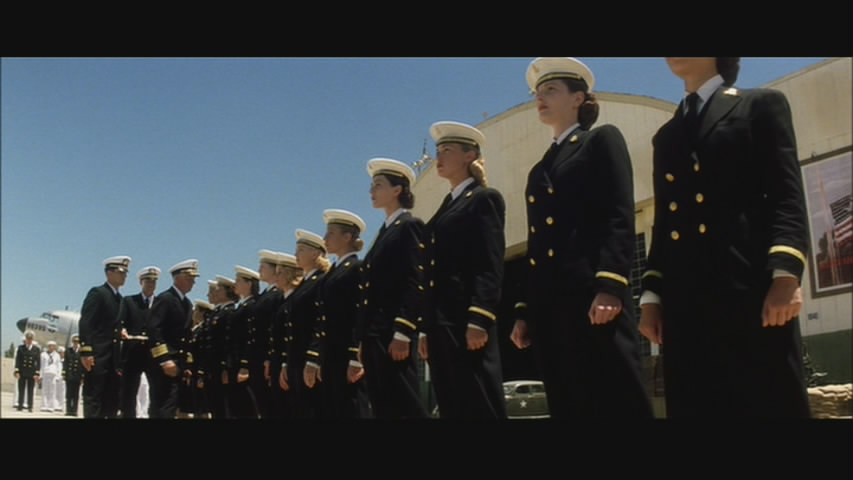
Michael Bay released a directors cut of Pearl Harbor, intending the more adult language and extra gore to obfuscate his anaemic narrative from criticism; to perhaps exonerate his failure the first time around into something a little more tonally required for a film like this. Epic fail. By adding in some diabolical ADR to Tom Sizemore (with his use of the F-word to indicate an elevated level of seriousness…. I mean, c’mon, really?) and a few moments of body-shattering gore (which are so obviously store-bought mannequins it’s not funny) and this will somehow placate those already critical into a kind of blood-lust-gorged numbness? The directors cut of Pearl Harbor fails to enlighten more information that we might have missed the first time around, it merely reduces the already flat characters to even more gung-ho weapon toters, scowling and advocating slaughter in retribution, as if that’s the most common thought whilst under fire. Personally, I’d have crapped my pants while most of the fighting was going on, and I think so would most of the pretty-boys in the film. I can’t denigrate the film for this reason alone, though.
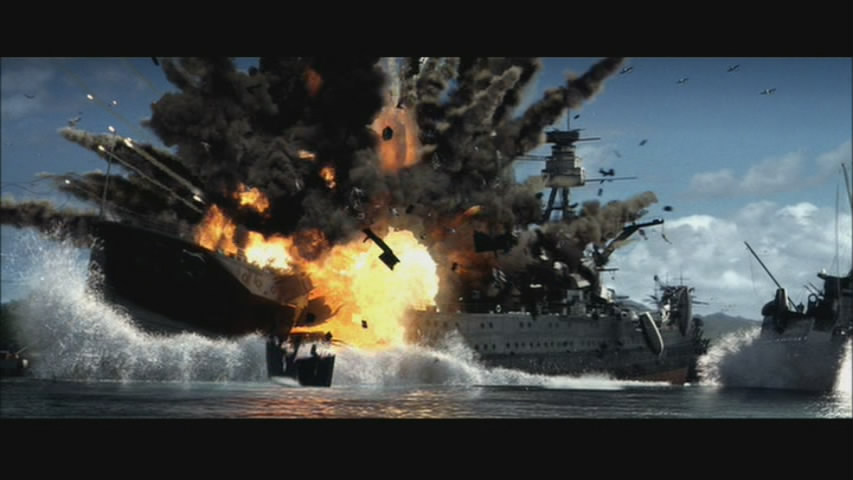
For those looking for an accurate, historical record of what transpired in Hawaii on that fateful day in December, 1941, then you’ll have to keep looking. Bending history to suit a wide-screen aspect ratio doesn’t lend itself too well to placating the purists, and although Bay tries hard to engender some patriotic pride in the fallen heroes of that day, the films’ bombast and overkill in execution leaves us simply numbed to the proceedings. A dearth of emotional content from script or cast, and a lackluster opening and closing act (and a substantial lull in the middle one too, I might add) and Pearl Harbor is a botched blockbuster of the highest order. Michael Bay’s least critically successful film is, in this instance, perhaps deserving of some vitriol, however I can understand, and appreciate, what was attempted here with this movie. A good effort, undone by some appalling lapses in judgement.


 Pearl Harbor (2001)
Pearl Harbor (2001)








This is supposed to be a World War 2 based movie. Its the sort of movie anyone would expect to be an accurate enough dramatisation of events that actually happened.
Instead what we get is an attempt to make another Titanic by including a love triangle that is dominant over the whole history aspect. It just doesn't seem right.
Being a historic epic, they could have cut down on the whole love story and focused more on what would have been relevant such as the Japanese preparation of the attack and the situation President Roosevelt was finding himself in. The sequence of the actual attack on Pearl Harbour was spectacular! Perhaps if they extended it and made it a more major part of the film it would have been more worthy. Another major flaw with this movie is that after the attack sequence the movie dragged on for another hour trying to give an epilogue which was totally irrelevant.
I reckon if these were taken aboard, then Pearl Harbor would have been a much better movie and perhaps would not have flopped at the box office.
You're right, petre, the contrast between the romance and the action is jarring rather than appropriate. Bay really screwed this film up. if they'd cut out the romantic crap, and made it a straight-up action film, it would have been a ripper.
I remember first reading an article in the paper on the fact they were going to make this. "Wow," I thort, " big three hour movie action flic on Pearl Harbour, made by the bloke who directed Armageddon. Should piss all over Tora Tora Tora. Can't wait!"
Well, we went to the cinema in 2001 to watch it. OK – a few good moments … the planes flying past the golf course and the clothes lines while the kiddies are playing baseball; the first torpedo that drops in the water and explodes while the guys are doing maintenance/painting/cleaning work on the side of the ship; Tom Sizemore shooting his pump action gun at the planes (a precurser to his home videos, I guess). All good stuff.
But then there's the rest … Afflict crashing his plane in the Atlantic during (if I recall correctly) the battle of Britain; the whole Baldwin mission (although, I must confess, I did like the fact they were bombing steel mills), and the third act when the boys are are in Japan after crashing.
A movie called Pearl Harbour should have been about Pearl Harbour, not some broader melodramatic claptrap about heroic American WW2 pilots who fought in it.
I felt let down by this too, Mark. I figured it'd be some giant action war film that'd portray the sacrifice and heroism the US military gave that day – too bad they had to add in a pointless melodrama around it all….
I watched this film in about forty minutes once, by skipping directly to the action sequences – God, that made it a much better film. Actually, it made is more coherent.
this is a very good film, its very different than the other war film, the love story, the war, and the drama looks good in this film.
No, it doesn't.
Again with the name calling? *facepalm*
One of the worst movies ever made that spat on American history and everything our veterans fought and died for.
Hmmm… Yeah, it did.
This movie sucked
Yeah. It did.
You are correct there.
Glad you agree.
This movie is very good because it tells the history of Japanese invasion to the air base at Pearl Harbour. with the add with an interesting storyline so that it becomes fil my favorite history
Um, what?
Are you retarded you fucking faggot.
Probably, but there's no need for name calling.